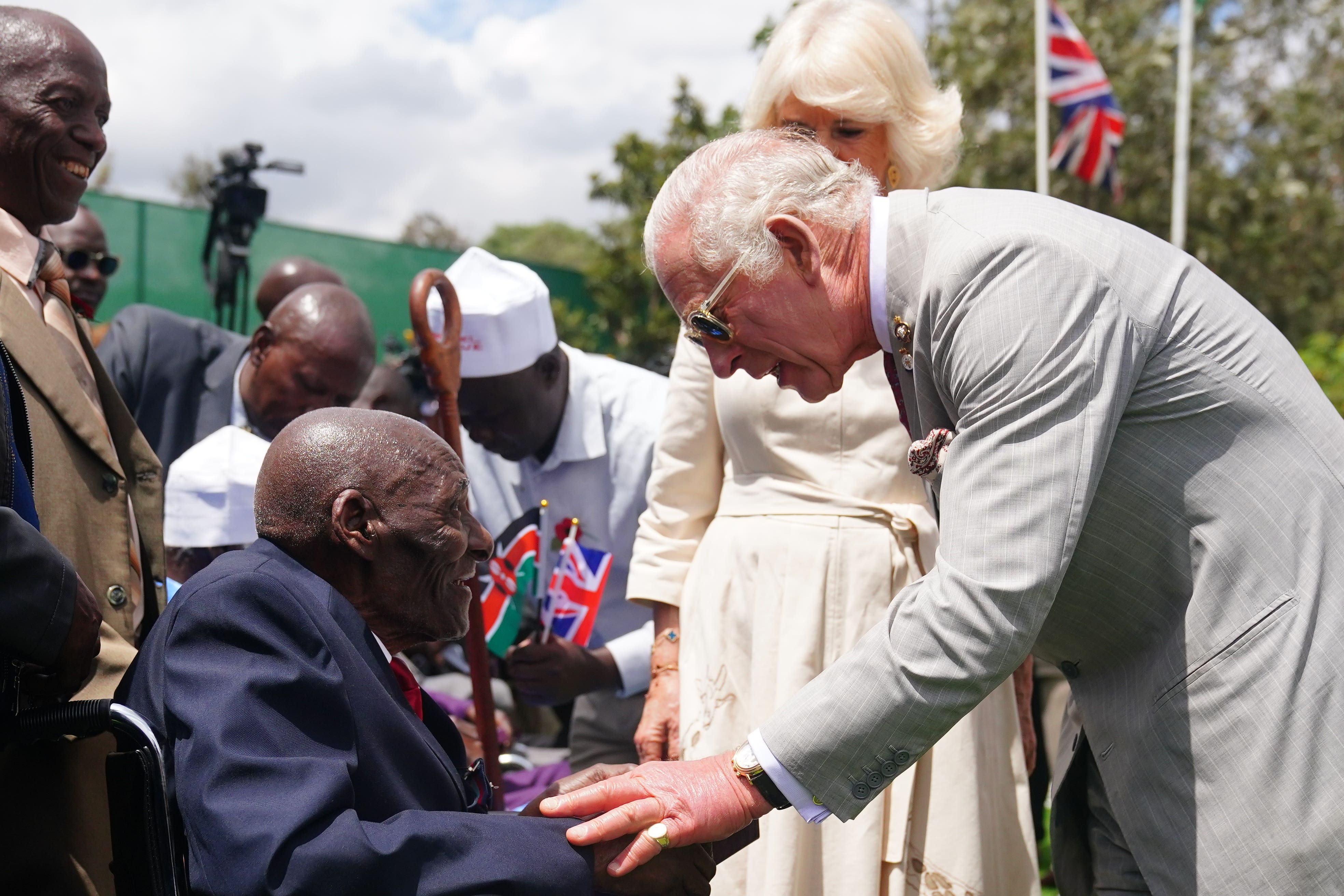Charles presents medals to Kenyan thought to be one of oldest veterans
The King handed the five medals to former corporal Samweli Mburia during a poignant ceremony.

Your support helps us to tell the story
From reproductive rights to climate change to Big Tech, The Independent is on the ground when the story is developing. Whether it's investigating the financials of Elon Musk's pro-Trump PAC or producing our latest documentary, 'The A Word', which shines a light on the American women fighting for reproductive rights, we know how important it is to parse out the facts from the messaging.
At such a critical moment in US history, we need reporters on the ground. Your donation allows us to keep sending journalists to speak to both sides of the story.
The Independent is trusted by Americans across the entire political spectrum. And unlike many other quality news outlets, we choose not to lock Americans out of our reporting and analysis with paywalls. We believe quality journalism should be available to everyone, paid for by those who can afford it.
Your support makes all the difference.The King has presented medals to a Kenyan believed to be one of the world’s oldest surviving Second World War veterans after he lost his military honours.
Charles handed the five medals to former corporal Samweli Mburia, during a poignant ceremony where other old soldiers who fought for Britain against Hitler’s regime also received replacements of their military honours.
It is claimed Mr Mburia is 117 years old and when told of his great age the King said: “I think you must have been living on wild honey and locusts.”
I am so happy and proud to be receiving my medals from the King
Many Kenyans who served with the British threw away their medals during the Mau Mau uprising against colonial rule in the 1950s, for fear of being accused of being British collaborators.
Charles shook the hand of the elderly veteran and thanked him for his service and lighted the mood by asking: “I hope all the right ones are there.”
Specialist medal auctioneers Spink sourced the original medals – 1939-1945 Star, Africa Star, Burma Star, Defence Medal, War Medal – for Mr Mburia who served in Egypt, Abyssinia and Burma with the Royal Engineers.
The presentation ceremony was held at a Commonwealth War Graves Commission cemetery in Nairobi where Charles and Camilla attended a short act of remembrance with the King laying a wreath.
At one point Charles tripped on one of the many large squares of artificial grass covering the site, as there had been persistent rain over the past few days, but quickly steadied himself.
The veteran’s daughter Idah Kagweni, 54, said her father’s medals were lost and described the mood among Kenya’s ex-military as the struggle to end British rule became violent.
She said: “They were fearful to be found with those medals because of the Mau Mau. During that time some of them threw them in the sea or they hid them and don’t know where they hid them.”
The veteran, speaking through his daughter, said: “I am so happy and proud to be receiving my medals from the King.”
Kenya’s uprising against colonial rule, commonly known as the Mau Mau rebellion, was an armed movement that began in the early 1950s, fuelled by the resentment some members of the Kikuyu tribe felt towards their British rulers, European settlers who farmed land in Kenya and a lack of political representation.
White farmers were targeted in violent attacks, and Kikuyu said to have collaborated with the authorities during the unrest known as the Emergency.
The Kenya Human Rights Commission has claimed 90,000 Kenyans were executed, tortured or maimed during the British administration’s counter-insurgency.
During the day Charles privately met representatives and family members of those who were engaged in the struggle for Kenyan independence.
The group included Mzee Gitu wa Kahengeri, secretary general of the Mau Mau Veterans Association.
In an interview a few weeks ago with AFP he said: “If I were given a place and a chance to speak to the King… the first question I would ask him is why did you keep silent?”
In a banquet address delivered on Tuesday evening, Charles spoke about the “abhorrent and unjustifiable acts of violence” committed against Kenyans during their fight for independence from Britain but stopped short of an apology.
Kenya’s President William Ruto praised the King’s “exemplary courage” in shedding light on “uncomfortable truths”, but described the colonial reaction to African struggles as “monstrous in its cruelty” and said “much remains to be done in order to achieve full reparations”.